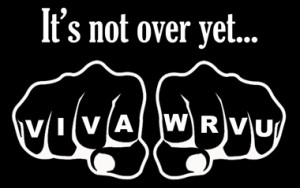This week, WRVU Friends and Family filed a Petition to Deny the license renewal for the Vanderbilt University radio station WFCL. Known as WRVU until June 1, 2011, WFCL is the non-commercial educational radio station licensed to Vanderbilt Student Communications (VSC) in Nashville.
In June, 2011, WRVU DJs and volunteers were told that the station would be sold to Nashville Public Radio for use as a classical public radio station within its WPLN network.
Soon after the announcement of a pending sale, an operating agreement went into effect and VSC is continuing to rent airtime to Nashville Public Radio over WRVU’s (now WFCL) 91.1 FM signal. Nashville Public Radio currently operates WFCL under the brand name Classical 91 One.
Supporters of the old college radio station WRVU have rallied under the non-profit organization WRVU Friends and Family and have been arguing against the sale since last year. Although the terrestrial signal is being utilized by Nashville Public Radio, students at Vanderbilt are continuing to operate the online-only radio station WRVU.org.
In March, VSC submitted its application to renew the license for the former WRVU. The license is set to expire on August 1, 2012.
According to a statement by WRVU Friends and Family,
“WRVUFF’s petition insists that the FCC hold Vanderbilt Student Communications (VSC) accountable for VSC’s ultra vires actions (actions in excess of legal authority) in initiating the sale agreement with WPLN. The petition implores the FCC to take seriously its legal obligation to consider the public interest when making a license renewal determination. It also demonstrates that recent actions by VSC compel a finding that renewal, at this time, is not in the public interest.”
The Petition to Deny points out that when Vanderbilt Student Communications was incorporated in 1967, it made clear that it was founded for “the purpose of the operation, publication and dissemination of student communication media at Vanderbilt University…” A Bylaws Appendix from 2002 further adds that, “Critical to all facets of the VSC mission is, above all, the preservation of a core set of student media outlets…”
In addition to claiming that the sale of WRVU is counter to the mission of the VSC, the Petition to Deny also argues that the VSC Board lacks the authority to not only sell the WRVU license, but also to enter into an agreement to rent airtime to an outside entity. According to the Petition to Deny, changes in the makeup of the VSC Board were not approved by the FCC and therefore “these changes denied the entity any legal authority to sell off its license.”
The Petition to Deny also points out that in light of the recent Consent Decree between University of San Francisco and Classical Public Radio Network in relation to unauthorized payment for airtime, the FCC should scrutinize the payments being made to VSC from Nashville Public Radio. The Petition to Deny states:
“The transaction illustrates the ease with which a ban on cash for air time may be circumvented by willing parties to an asset purchase, using skillful drafting…in this case the substantial, albeit disguised, $450,000 programming fees do constitute consideration and do establish a clear-cut rule violation…”
Finally, the Petition to Deny claims that VSC has committed an “improper relinquishment of control” of WRVU by granting Nashville Public Radio complete control of the station. The Petition to Deny asks that the FCC reject the renewal application for WRVU and “designate the application for hearing on issues to determine whether renewal of VSC’s license is in the public interest.”
WRVU Friends and Family explained in a statement that, “License Renewal under these circumstances is simply not in the public interest…We are confident that the FCC will give due consideration to the issues we raise and will ultimately reject VSC’s renewal application while the agreements with WPLN are in place.”



